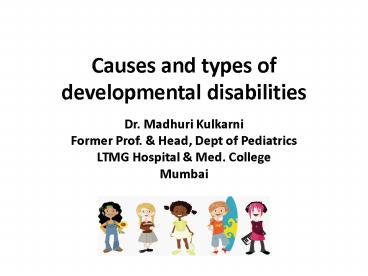Causes and types of developmental disabilities - PowerPoint PPT Presentation
1 / 20
Title:
Causes and types of developmental disabilities
Description:
Causes and types of developmental disabilities Dr. Madhuri Kulkarni Former Prof. & Head, Dept of Pediatrics LTMG Hospital & Med. College Mumbai Introduction ... – PowerPoint PPT presentation
Number of Views:4054
Avg rating:3.0/5.0
Title: Causes and types of developmental disabilities
1
Causes and types of developmental disabilities
- Dr. Madhuri Kulkarni
- Former Prof. Head, Dept of Pediatrics
- LTMG Hospital Med. College
- Mumbai
2
Introduction
- Development Process of maturation or
acquisition of skills - Neurodevelopment Acquisition of basic gross
fine motor skills. Depends to a great extent on
maturation of neural tissue. - Cognitive development depends upon genetic
environmental factors. In early childhood
difficult to differentiate from neurological
behavioural maturation. - Complex dynamic process
- Periods of acceleration deceleration
3
Development
- Continuous process
- Definite sequence
- Head to toe
- Gross to fine
- Depends upon neurological maturation
- Influenced by external factors
4
Developmental Domains
- Gross Motor
- Fine motor
- Language
- Social, communication
- Adaptive
- Vision
- Hearing
5
Specific Areas in the Brain
6
Childhood Disabilities
- Disability
- - Lack of or restricted ability to perform an
activity in the manner or within a range
considered normal by the society. - Handicap
- - A disadvantage for a given individual
resulting from a disability that limits or
prevents fulfillment of a role considered normal
for that individual.
7
Cont.
- Incidence About 8-10 of children
- Establishment of Diagnosis Essential for
Intervention Plan - Completeness of diagnosis Availability of
Experienced personnel and Lab services
8
Types of Disabilities
- Physical defects / dysfunction
- Sensory deficits
- Intelligence / cognitive deficits
- Emotional disturbances
- Learning problems
9
Cerebral Palsy
10
Physical / Motor
- Poliomyelitis
- Cerebral palsy
- Loss of limb/s
- Motor neuron disease
- Neuro muscular disorders
- Muscular dystrophy
Sensory deficit
- Partial / complete blindness
- Partial / complete deafness
11
Speech and language disorders
- Disorders of articulation
- Disorders of voice-pitch, loudness
- Disorders of rhythm stuttering
- Disorders of expression
12
Disorders of Intelligence
- Mental Retardation
- Slow learners
Pervasive Developmental disorders
- Autism
- Asperger Syndrome
13
Learning disorders
- Specific Learning disabilities
- Dyslexia
- Dysgraphia
- Dyscalculia
14
Causes of Disabilities
- Prenatal
- Genetic, Chromosomal
- Infections in mother
- Exposure to toxic substances
- Thyroid deficiency
- Congenital defects in the brain
15
Causes
- Perinatal
- Deprivation of oxygen during birth
- Abnormal fetal presentation
- Difficulties during the process of labour
- Injury to the brain bleeding in the brain
- Low weight baby
- Breathing problems
- Severe jaundice
- Severe infection
16
Causes
- Postnatal
- Infections of the brain
- Iodine deficiency
- Accidents Head Injury ? Bleeding Hypoxia
- Metabolic disorders hypoglycemia, PKU
- Malnutrition
- Environmental causes Lack of love,
security, motivation, discipline
17
Needs of children with disabilities
- Normal needs
- Medical care, immunization, play, education etc.
- Special needs
- Special services physiotherapy, early
intervention therapy - Special aids Hearing aids
- Special equipment Calipers, shoes, wheel-chair
- Special Education
- Care of the whole family
18
Educational Needs
- Main-stream education
- Remedial education
- Curriculum adjustment
- Changes in the examination pattern
- Concessions / Accommodations
19
Our Roles
- Developmental surveillance
- Identification of abnormality
- Assessment
- Remedial plan
- Treatment
- Rehabilitation
- Vocational training
20
- Thank you !































